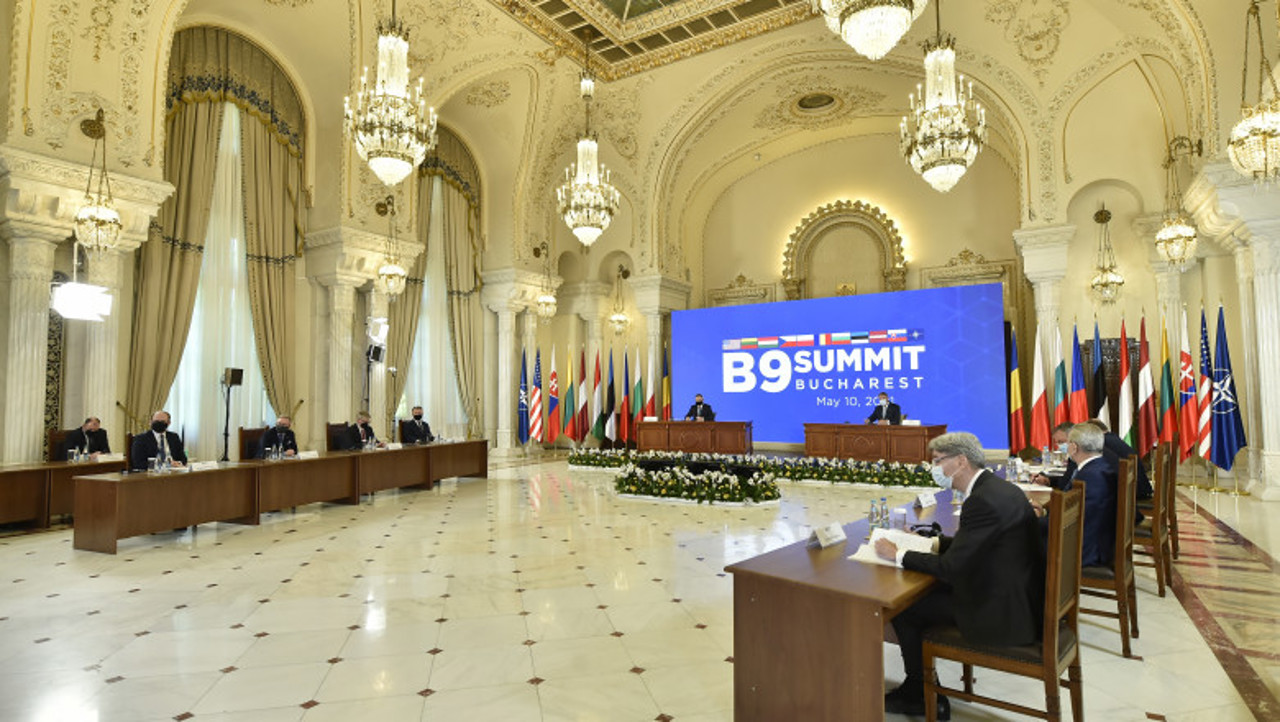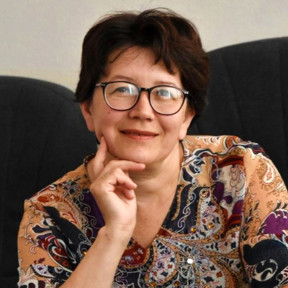Joint statement at the B9 Summit: Russia is and will remain the most important and direct threat to NATO security
Russia is and will remain the most important and direct threat to NATO security - reads the joint statement of the co-presidents of the Bucharest Format Summit 9 (B9). In the document signed today in Riga by the presidents of Romania, Poland and Latvia, they emphasized that China's and Russia's attempts to undermine the rules-based international order run counter to Euro-Atlantic values and interests, Radio Romania News reports.

The Heads of State and Government of Bulgaria, the Czech Republic, Estonia, Hungary, Latvia, Lithuania, Poland, Romania and the Slovak Republic met today in Riga, welcoming the participation of the NATO Secretary General, as well as our most recent Allies Finland and Sweden at this meeting.
Here is the full text of the Chairs’ Statement of Bucharest 9 Summit in Riga
"As the Chairs of the meeting we convey the following:
We meet in the 75th anniversary year of the strongest, most enduring and most successful Alliance in history and in the year of important accession anniversaries of all our countries. We celebrate this occasion with the Alliance standing as strong as ever, resolute and united. Recent accession of Sweden and Finland further strengthens NATO and enhances our collective security. This is also reaffirming our commitment to the Open Door Policy.
NATO’s key purpose and greatest responsibility is to ensure our collective defence, against all threats, from all directions. We underscore the importance of the transatlantic bond for our security and unity. Allies stand united and committed to deter and defend every inch of Allied territory, preserve the sovereignty and territorial integrity of all Allies and prevail against any aggressor and deny any adversary any possible opportunity for aggression.
We have enhanced and will continue to substantially strengthen Allied posture for deterrence and forward defence in the Eastern Flank, from the Baltic to the Black Sea.
We reiterate Allied commitment to the implementation of the decisions taken at the Madrid and Vilnius Summits to significantly strengthen the Alliance's deterrence and defence posture, underpinned by a new generation of NATO defence plans, fully resourced with necessary forces, stockpiles and capabilities, including air and missile defence, and regularly exercised. As part of the efforts to advance the executability of NATO defence plans, we underscore the importance of command and control and force structures, enablement and military mobility, including improving or extending relevant infrastructure, such as the extension of the NATO Pipeline System.
We welcome the substantial progress that Allies have made on defence investment, along with our commitment to invest in defence annually a minimum of 2% of GDP and beyond, and underline that in order to meet the requirements across all domains arising from a more contested security order increased defence spending and investments are required. In addition, an Allied commitment to urgently deliver the most critical capabilities is key to execute NATO’s defence plans.
A strong defence industry across the Alliance remains essential. We are taking bold steps towards reinforcing our defence industry capacity to fill the gaps and shorten the supply chains.
Russia is and will remain the most significant and direct threat to Allied security. We will work on a comprehensive strategy to contest, constrain and counter Russia, including by limiting Russia’s capacity to reconstitute its military and its ability to pose threats. We remain adamant in our efforts to sustain international pressure on Russia, including through sanctions and other measures for as long as Russia continues its hostile policies and actions, including blatant violation of international law.
We are deeply concerned about Russia’s recent malign hybrid activities on Allied territory, which constitute a threat to Allied security. These incidents are part of an intensifying campaign of activities which Russia continues to carry out across the Euro-Atlantic area, including sabotage, acts of violence, cyber and electronic interference, provocations related to Allied borders, disinformation campaigns and other hybrid operations. We support and stand in solidarity with the affected Allies. We will act individually and collectively to address these actions, boost our resilience and continue to coordinate closely to ensure that the Alliance and Allies are prepared to deter and defend against hybrid actions or attacks.
We condemn Russia's behaviour, and we call on Russia to uphold its international obligations, as Allies do theirs.
We meet at a time when Russia shows no signs of backing down from its brutal war against Ukraine. We reaffirm our unwavering support for an independent and sovereign Ukraine within its internationally recognized borders. A strong, independent, and democratic Ukraine is vital for the stability of the Euro-Atlantic area. We continue to call on Russia to immediately stop all hostilities of its war of aggression and unconditionally withdraw its forces from the territory of Ukraine.
We also condemn all those, including Belarus, who are actively facilitating Russia’s war effort and malign hybrid influencing, including against Allies. We urge them to stop their complicity to the Russian aggression and destabilizing activities. The deepening strategic partnership between the People’s Republic of China and Russia, and their mutually reinforcing attempts to undercut the rules-based international order run counter to our values and interests. We call on all states to uphold the international order, including the principles of sovereignty and territorial integrity, as enshrined in the UN Charter and to abstain from supporting Russia’s war effort in any way, and to refrain from any action that helps Russia circumvent sanctions.
We remain as resolute as ever in supporting Ukraine for as long as it takes for Ukraine to prevail. We are committed to continue and enhance our broad support, including by military, financial or humanitarian means, to Ukrainians in their heroic defence of their nation, their territory, and our shared values.
Russia bears full responsibility for its illegal, unjustifiable, and unprovoked war of aggression against Ukraine. There can be no impunity for Russian war crimes and violations and abuses of international law, including human rights and international humanitarian law.
We commend the efforts to organise in Switzerland the Summit on Peace in Ukraine. We encourage the international community to contribute to a just and lasting peace in Ukraine that upholds the principles of the UN Charter, in particular sovereignty, territorial integrity and independence, and welcome efforts in this regard. We welcome and support President Zelenskyy’s commitment in setting out the principles for a comprehensive, just, and lasting peace through his Peace Formula.
We fully support Ukraine’s Euro-Atlantic aspirations. The security of Ukraine is of great importance to Allies, the Alliance and to a lasting peace in the Euro-Atlantic area. We stay firmly committed to the irreversible path set out by the historic decisions made at the NATO summits from Bucharest to Vilnius, firmly anchoring Ukraine’s future membership in NATO, and will continue advancing it further.
We expect that decisions at the Washington Summit will promote Ukraine’s full interoperability with NATO and build a tangible bridge for its NATO membership. On the road to the Washington Summit we stand committed together with Allies to agree on a substantial support package, including on a comprehensive NATO role in supporting Ukraine’s inherent right for self-defence and a pledge to ensure sustainable long-term financial support. The creation of a new NATO-Ukraine Joint Analysis, Training and Education Centre in Poland will also play an important role in ensuring interoperability.
We commend Ukraine for its commitment and substantial progress, despite the war circumstances, in its reform agenda, which is essential to further advance on the path toward EU and NATO membership. We encourage Ukraine to continue its reforms in accordance with the Allies’ recommendations for Ukraine’s adapted Annual National Programme.
Our partnerships are essential in supporting NATO’s three core tasks and our 360-degree security approach, furthermore highlighted by the current security environment.
We commend the Republic of Moldova for its efforts to maintain stability and advance reforms on its European path. We will continue to further strengthen NATO’s tailored support to Bosnia and Herzegovina, Georgia and the Republic of Moldova, recognising that these partners are most affected by Russia’s malign influence.
We will continue to strive for more strategic, more coherent and more effective partnerships to respond best to partners’ needs and goals of the Alliance, in particular with the European Union, as well as with partners in our neighbourhood, in the Indo-Pacific and in the South





